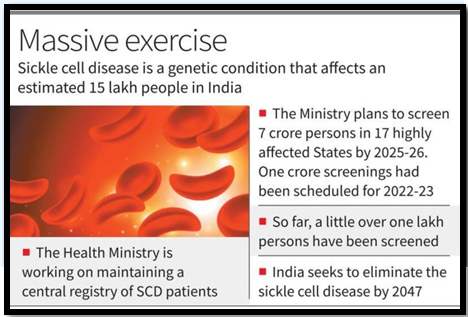INDIA EYES BREAKTHROUGH AGAINST SICKLE CELL
Why in News ?
India’s progress towards developing a gene therapy for sickle cell disease using CRISPR-Cas9 technology. It emphasizes the government’s efforts to involve grassroots healthcare workers in implementing this mission and aims to eradicate sickle cell disease by 2047, particularly among the Scheduled Tribes.
Source-TH
About the News
- Progress in Gene Therapy Development:India is advancing towards developing a gene therapy for sickle cell disease, a genetic blood disorder prevalent among Scheduled Tribes.
- Vibhu Nayyar, Secretary of the Tribal Affairs Ministry, expects positive results from ongoing laboratory tests by January 2025.
- Research and Technology:AIIMS Director M. Srinivas stated researchers are using CRISPR-Cas9, a gene-editing tool, to develop the therapy.
- India aims to be among the first countries to use this method for treating sickle cell disease within the next year.
- National Conclave and Government Efforts:The National Conclave on Generating Awareness on Sickle Cell Disease was organized by the Tribal Affairs Ministry and the Birsa Munda Centre at AIIMS.
- Union Tribal Affairs Minister Jual Oram emphasized involving ASHAs and anganwadi workers for effective implementation.
- Ongoing Tests and Future Steps:Tests by the CSIR-IGIB are currently in progress, with the next phase involving patient testing.
- This follows the U.S. FDA’s approval of CRISPR-Cas9 technology for sickle cell disease treatment in December 2023.
- Challenges and Mission Goals:One major challenge is making the therapy cost-effective.
- India’s mission to eradicate sickle cell disease by 2047 includes conducting over seven crore screenings, with three crore already completed.
- The CRISPR-Cas9 system allows precise DNA editing, making it a fast and versatile option.
- Commitment and Collaboration:The Union government is dedicated to the sickle cell disease eradication mission, calling for inter-ministry collaboration.
- Technical panel discussions were held on recognizing, screening, and managing the disease.





